Advertisement
H&N Blog: Libyan Unrest Fuels Refugee Crisis
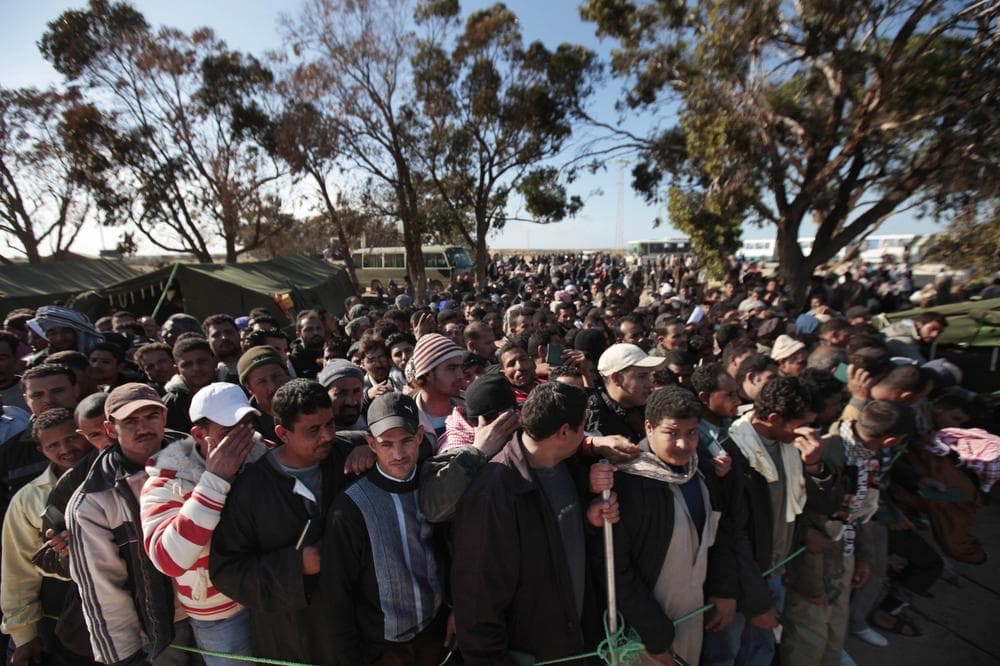
The UN is urging "dramatic" help to stem what it warns is a looming crisis along Libya's border with Tunisia, as tens of thousands flee unrest in Libya. The BBC reports that some 140,000 people have fled to Tunisia and Egypt.
CNN reports that Tunisian police tried to hold back a rush of people along the border.
Reports and television coverage show crowds made up of large number of impoverished workers. Many from Bangladesh, Pakistan, Sudan and Thailand stranded with no travel documents, were trying to flee to Egypt.
Melissa Fleming, spokeswoman for the UN High Commissioner for Refugees, told the Associated Press that some sub-Saharan Africans were not being allowed into Tunisia.
"We're very concerned that racism could be a factor" blocking the exit of sub-Saharan Africans, said Fleming.
"All borders, land, air and sea should be opened in a non-discriminatory manner. Anyone who needs to flee should be able to flee," she said.
Reuters reports that Kenyans and Nigerians fleeing the unrest faced attacks from Libyan citizens, as speculation continues that Col. Gadhafi is employing mercenaries from sub-Saharan Africa to support him.
From Reuters:
“We were being attacked by local people who said that we were mercenaries killing people. Let me say that they did not want to see black people.” -Julius Kiluu, a 60-year-old building supervisor who arrived back in Nairobi, told Reuters.
An African fleeing Libya told the BBC that he felt targeted.
"They say the president brought some blacks to fight against the Libyans, so now they decided, if they see black [man], they are deciding to hunt him." -African fleeing Libya
There are concerns about falling temperatures, and the availability of running water at camps that have been set up for refugees along the border with Tunisia and Libya and Egypt and Libya.
New York Times:
“The resources are being drawn down as quickly as we can pump them in,” Ms. Wilkes said in a telephone interview, adding that the situation needed “a really dramatic response and a quick response.”
-Sybella Wilkes, a spokeswoman for the United Nations High Commissioner for Refugees in Geneva
-Posted 9:35, Tuesday, March 1, 2011
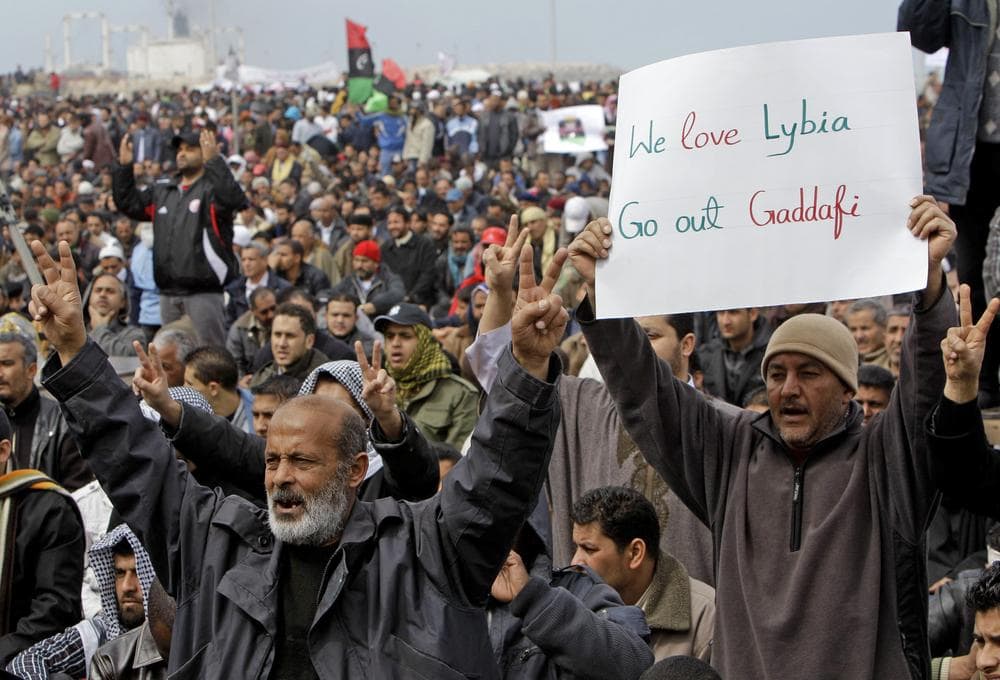
We've heard some passionate, frustrated and frightened voices out of Libya recently, again we're not using full names to protect our guests' safety.
First, our interview with a 31 year-old protester named Ahmed, who told us about the deadly government crackdown in Libya's capital, Tripoli. He said the despite the violence, demonstrators aren't losing their resolve. “Everyone in Libya has spoken," he said. "They’re willing to give up their lives for the sake of freedom.”
We also spoke with two Libyans, one from Tripoli, and one from Benghazi, who called for more international support in telling Leader Col. Moammar Gadhafi to "pack your bags and go."
We also touched down at Plymouth High School in Massachusetts, where teacher Greg Kulowiec is watching history unfold in the middle east with his 9th grade class.
And we heard about the questions being raised about American-based consulting companies hired by the Libyan government, and about how unrest in Libya is affecting world oil markets.
-posted 3:45 pm, Friday February 25, 2011
The Associated Press had this photo today from Easthampton, Mass. Oil prices rose past $99 a barrel this week, as companies shut down production amid the violence. (Libya is Africa's third largest crude supplier, and exports to Europe.)

NYT's Tom Friedman writes that it's a good time for a gas tax... so the U.S. can stop treating the Middle East like a "collection of big gas stations."
"With one little gasoline tax, we can make ourselves more economically and strategically secure, help sell more Chevy Volts and free ourselves to openly push for democratic values in the Middle East without worrying anymore that it will harm our oil interests. Yes, it will mean higher gas prices, but prices are going up anyway, folks. Let’s capture some it for ourselves....
It is about time. For the last 50 years, America (and Europe and Asia) have treated the Middle East as if it were just a collection of big gas stations: Saudi station, Iran station, Kuwait station, Bahrain station, Egypt station, Libya station, Iraq station, United Arab Emirates station, etc."
-Posted 3:15pm Wednesday, February 23, 2011
Did you know... more than half of Libyans are under age 18, according to this Libya primer in Mother Jones.
Also, CNN has a simple explainer about the differences between Sunnis and Shiites.
-Posted 9am Wednesday, February 23, 2011
More developments out of the region today:
- In Libya, anti-government demonstrators continue to make gains against the regime of Col. Moammar Gadhafi, despite a brutal government response. Foreigners continue to flee the country.
- In Yemen thousands came out in the capital city, Sanaa, and several legislators resigned their posts.
- And in Bahrain, the King is visiting neighboring Saudi Arabia to seek advice after tens of thousands took over the country’s capital in a massive show of force against the monarchy yesterday with the cry, “Tunisia, Egypt, Are We Different?”
Hear our interview with a Libyan protester in Tripoli who explains why protesters aren't going to back down.
-Posted Wednesday, February 23, 2011
In Libya, the Associated Press reports that protesters have claimed control of Libya's second largest city after days of violent unrest.
As protesters across the country continue to call for leader Col. Muammar Gaddafi to step down, which he has shown no sign of doing. Gaddafi's son is warning that the country is on the brink of civil war.
Al Jazeera English reports that more than 200 anti-government protesters were killed during the last few days of violence in Libya's second largest city, Benghazi. There are reports of troops opening fire on protesters, and of snipers firing at demonstrators from rooftops.
- Watch a live stream from Benghazi here
-Posted Monday February 21, 9:09 am
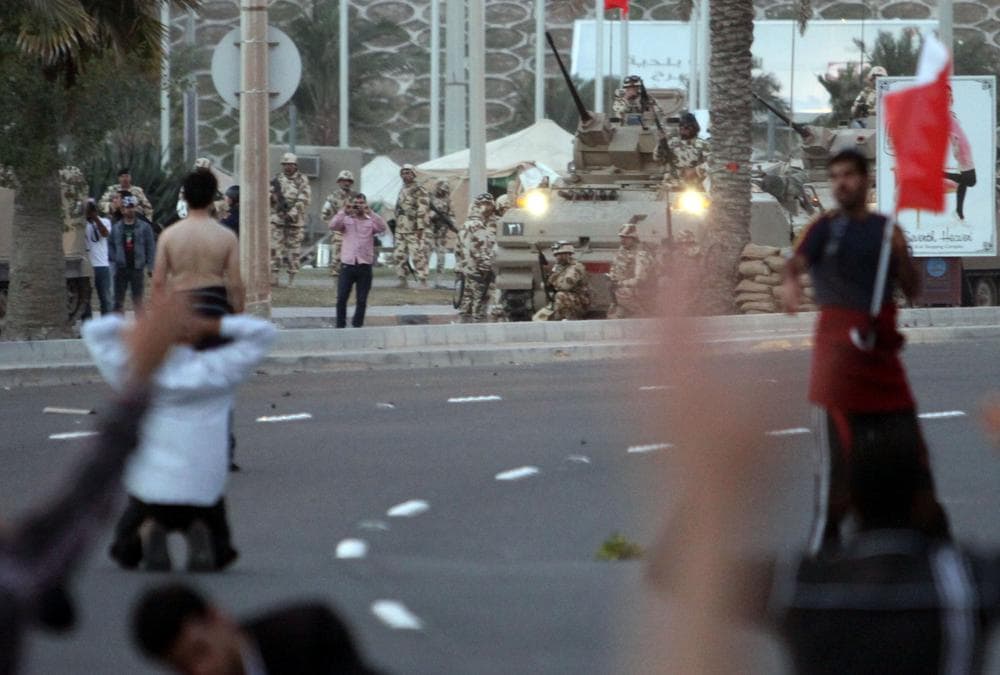
In Bahrain Friday, soldiers opened fire on people walking towards the square that's been at the center of the anti-government demonstrations. Hospital officials say at least 50 are injured, and the White House has expressed displeasure at the rising tensions.
Here's a video from Bahrain, it is graphic, and was posted recently by the Bahrain Center For Human Rights.
The BBC reports more deadly clashes between anti-government and police in the Libyan city of Benghazi, after more than 15 people were reportedly killed in clashes with security forces Thursday.
In Yemen, demonstrators clashed with riot police who fired gunshots and tear gas.
There are also protests in Jordan and Djibouti.
-Posted Friday February 18, 2011 with reporting from the Associated Press and the BBC
In Bahrain this morning, the military said it has taken control of key parts of the capital city, Manama. This comes after riot police carried out a pre-dawn raid on demonstrators, many of whom were sleeping in the city's Pearl Square.
If you're having trouble keeping track of what issues are causing the protests in countries from Bahrain to Yemen, listen to our Mideast primer, you can see an interactive map here.
-Posted Thursday February 17, 2011
___
Anti-government protesters continue to turn out on streets across the Middle East.
In Iran:
Tens of thousands took to the streets yesterday for an opposition rally in solidarity with Egypt's protests. That has led conservative Iranian lawmakers to call for opposition leaders to be tried and executed.
The BBC reports that 50 conservative MPs marched through Iran's main hall of Parliament on Tuesday chanting "Death to Mousavi, death to Karroubi." (Mir Hossein Mousavi and Mehdi Karroubi are opposition leaders.) The two were placed under house arrest yesterday, and dozens of other people were detained. Here's a brief video, apparently from the streets of Tehran yesterday.
The Iran news website Tehran Bureau is also following the story.
In Bahrain:
Two people are reportedly dead after police and demonstrators clashed this week. The king of Bahrain says he'll investigate the deaths.
In Yemen:
Protests continue into a 5th consecutive day. Around 3,000 people are protesting in Yemen calling for political reform, and the ouster of the country's president, a U.S. ally. The Associated Press reports that many are university students and rights activists, but hundreds of people are expected to join as protesters move through the street. They're being met by resistance from pro-government demonstrators.
And in Egypt:
There are plans to draw up a new, temporary constitution.
-Posted 8:45am February 15, with reporting from the Associated Press
___
Days after Egyptian President Hosni Mubarak stepped down, unrest continues to spread across the Middle East. In Yemen, more than 1,000 protesters are marching for the fourth day, demanding the end of President Ali Abdullah Saleh's reign.
In Bahrain, police and protesters are skirmishing outside the capital ahead of planned protests. Dozens of protesters have reportedly been injured according to the Associated Press.
This video of police charging on protesters in Bahrain recently surfaced:
-Posted February 14, 2011
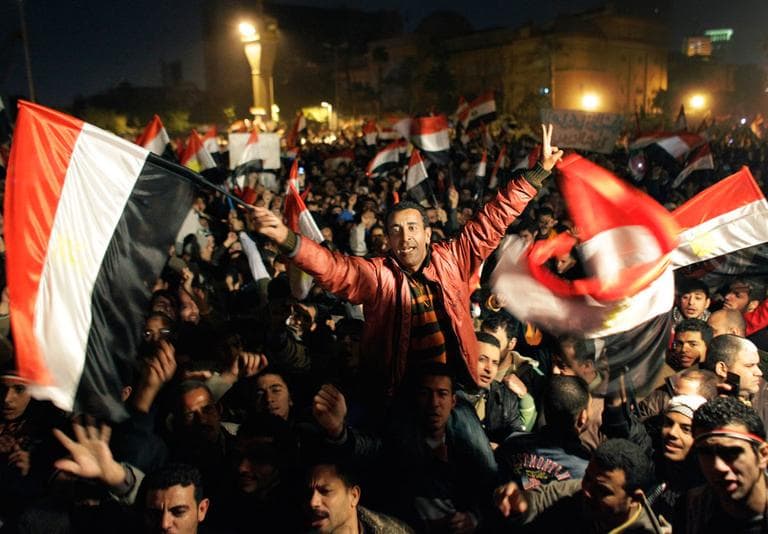
Google Executive, and opposition activist Wael Ghonim had this to say to us in reaction to President Hosni Mubarak's resignation today:
“Welcome back Egypt. They told us you died, hundreds of thousands of us went back on the streets to search for you.. and in 20 days we became 20 million until we found you.. welcome back Egypt.”
You can hear more of Here & Now's Friday Egypt coverage here.
Ghonim also did an interview with CNN. When asked, which country could be after Egypt, he said "ask Facebook."
President Obama spoke about Mubarak's resignation in a press conference today. He applauded Egyptians' "hunger for change."
Here's more from the Associated Press: "President Barack Obama says the Egyptian military has served patriotically and responsibly and now must ensure a transition of power that is credible to the Egyptian people. Obama says the military, in power in the wake of President Hosni Mubarak's resignation, must lay out a clear path toward fair elections."
-posted 3:30, Friday February 11
Here is video taken by an Al Jazeera English journalist, from Cairo's Tahrir Square two hours after Mubarak's resignation.
-posted 3:15, Friday February 11
Former BBC Journalist Shaista Aziz tweets:
shaistaAziz: AJE Taxi drivers are handing out balloons & sweets as people climb on their cabs and celebrate in Alexandria
-posted 3:10, Friday February 11
Some other things to think about...
- The Washington Post's Jon Alterman writes about how "Mubarak's departure... does little to address the fundamental issues" that brought protesters to the streets.
- The debate continues over whether this can be called the social media revolution. There's Malcolm Gladwell in the yay category, along with Google executive, and opposition organizer, Wael Ghonim who says "long live "revolution 2.0. " But Author Evgeny Morozov says it's more complicated.
- And...the website Grist looked at whether food prices fed into unrest in Egypt and Tunisia.
--Posted 3:05, Friday, Feb. 11
Egypt's VP announced today that President Hosni Mubarak is stepping down and the military will take control of Egypt. Celebratory chants rang through Egypt's Tahrir Square.
This comes on a day that protests spread through Cairo and parts of Egypt today, after Mubarak enraged protesters Thursday by refusing to step down.
Here's a tweet that quotes Mohamed ElBaradei, a member of the opposition and former head of the International Atomic Energy Agency.
fieldproducer: #Egypt ElBaradei: "This is the greatest day of my life. The country has been liberated." #Jan25 - AP
-posted 11:20, Friday, Feb. 11
Egyptian President Hosni Mubarak failed to step down from office Thursday night, after rumors circulated throughout the day that he would leave.
In an address to the country, Mubarak instead announced that he's handing over powers to his vice president, Omar Suleiman, and he promised to amend the constitution.
In Tahrir Square, protesters reacted with chants of "he must leave." They are planning a massive march to the presidential palace on Friday.
Here's a tweet from Mohamed ElBaradei, a member of the opposition and former head of the International Atomic Energy Agency.

-posted Feb 11, 4:45 pm
The Associated Press is reporting: "Head of Egypt ruling party says he expects President Mubarak to respond to protester demands."
Al Jazeera is saying "this could be the day that changes everything."
Cheers are ringing out from the protests in Tahrir Square, but things are also tense, because there's a lot of uncertainty about what's coming next.
You can hear more on: Al Jazeera: Watch live video from Cairo’s streets
Here is a tweet from Google's Wael Ghonim:
Ghonim: Mission accomplished. Thanks to all the brave young Egyptians. #Jan25
Though he changed his tune and later Tweeted:
Ghonim: Guys, dont do much speculations for now. Just wait and see #Jan25
and then:
Ghonim: Revolution 2.0: Mission Accomplished #Jan25
-Posted 10:30 am, February 10
(video with translations provided by Jan25 Voices) Watch the complete interview on YouTube
From CNN: Egyptian Google executive Wael Ghonim is "ready to die" to bring change to Egypt, he said Wednesday. In an exclusive interview with CNN, Ghonim also said it is "no longer the time to negotiate" with the regime of Egyptian President Hosni Mubarak. "There's a lot of blood now" that has been spilled, he said. Ghonim played a key role in organizing the protests that have convulsed Egypt for more than two weeks. He was the administrator of a Facebook page that is widely credited with calling the first protest January 25.
-Posted 6:54pm, Monday, February 9
Google executive Wael Ghonim gave an interview Monday night to“Ten P.M.,” on a popular independent Egyptian satellite channel, .
Ghonim gave his condolences to Egyptians who had died during the protests, he also urged people not to make a hero out of him.
-Posted 6:54, Monday, February 7
Update: The Wall Street Journal now reports that "Google executive Wael Ghonim has been released from government custody in Egypt..." according to State Department spokesman Mark Toner.
-Posted 12:23, Monday, February 7

Wael Ghonim, the Google executive who went missing during January 25th protests, has been symbolically named spokesman for the Egypt's "6th of April" youth opposition group.
"6th of April's" Khaled Wassef told CBS news that the nomination is an attempt to press the Egyptian authorities to release him. Though the government has not confirmed that Ghonim is being held.
released a statement saying that the company has no information about his condition or location.
-Posted 12:37, Friday, February 4
ABC's Christiane Amanpour managed to get a 30-minute interview with Egypt's President Hosni Mubarak. Before the interview's broadcast Thursday night, Amanpour had this to say to Diane Sawyer: "He told me 'I am fed up. After 62 years in public life, I have had enough, I want to go,' adding, 'If I resign today, there will be chaos.'"
-Posted 4:45, Thursday, February 3
The New York Times has a great bird's eye view graphic showing what's happening in Tahrir Square. Take a look.
-Posted 10:45 am, Thursday, February 3
Clashes are escalating in Tahrir Square with shots being fired as supporters of President Hosni Mubarak face off with anti-government protesters, after struggles yesterday turned deadly.
Egypt's Prime Minister Ahmed Shafiq apologized Wednesday for the fighting between pro and anti-government demonstrators, promising to investigate the violence, and hold those behind it accountable.
-Posted 8:00 am, Wednesday February 3
We're watching images of Mubarak supporters atop horses and camels attacking crowds of anti-government protesters.
And there are some tweets from Shadi Hamid of the Brookings Institution:
shadihamid Shadi Hamid
So I guess Obama's remarks (and phone call) last night really did the trick. if anything, mubarak is more emboldened #jan25shadihamid Shadi Hamid
Euphoria of last few days made ppl forget this is strong, smart regime. Regime was never gonna go quietly into night w-out fight #jan25
-Posted 9:40 am Wednesday February 2

In a speech on Egyptian state television Tuesday, President Hosni Mubarak said he will not run for another term in September's presidential elections. Mubarak said he wants to oversee a "peaceful transfer of power."
The Washington Post reports the announcement was less than Obama Administration officials had hoped for.
And speaking at the White House today following Mubarak's speech, President Obama said that a transition to democracy in Egypt "must begin now."
There was no shortage of negative reaction to Mubarak's announcement on Twitter:
arlettereneman: Why did #Mubarak not agree to organise early elections and transfer power? Stability of #egypt is more impotant than his own dignity!
NickKristof: RT @NickKristof: To me, bottom line of #Mubarak speech: Too little, too late. Upheavals will continue. Protesters want him OUT. #Egypt
-Posted 7:30pm, Tuesday February 1
If you're in Egypt or know someone who is, we want to hear your stories. Send us videos, photos or sound via our Facebook page or Twitter, or you can comment below or email us at letters@hereandnow.org.
-posted 9:10 am Tuesday, February 1
___
AJ Talk tweeted this at 8:23 this morning:
"Protesters give #Mubarak a chance to step down till Friday otherwise they'll head to the presidential palace #jan25 #jan28 #feb1 #tahrir"
-posted 8:30 am Tuesday, February 1
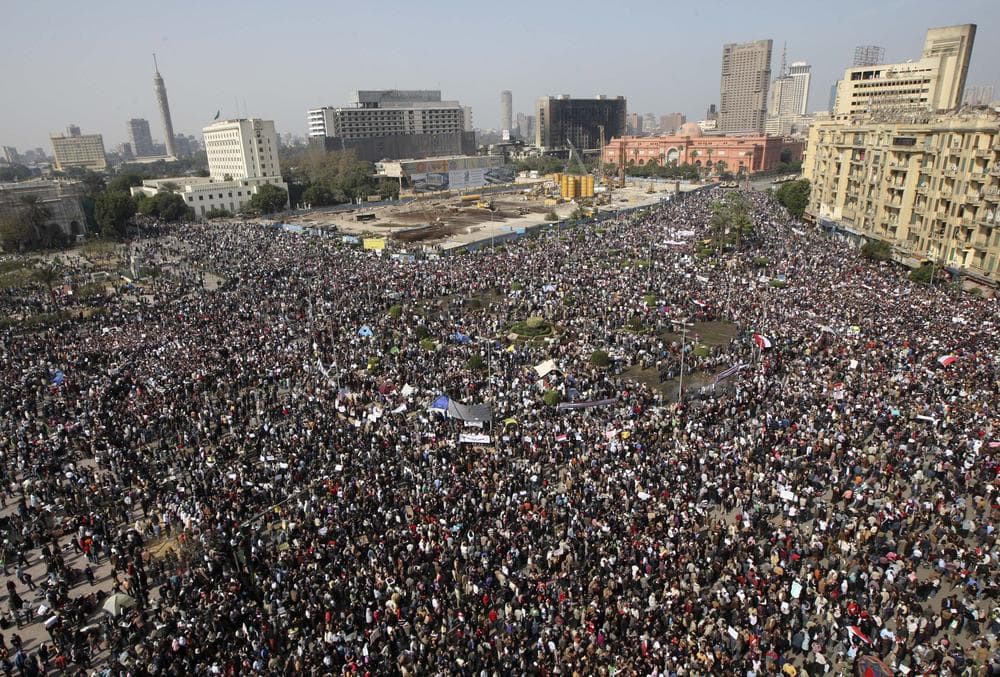
Tens of thousands of protesters are in Tahrir Square today, organizers are hoping as many as a million will come out.
Meanwhile, there are some interesting stories about the Muslim Brotherhood, the opposition group that's officially banned in Egypt, and has reportedly kept a low profile in protests. NPR looked at what role the group could play in a future government, while CNN asks whether Egyptians would want the Muslim Brotherhood in power.
-posted 7am, Tuesday February 1, 2010
We came across an interesting blog called "Arabist." It was started in 2003 by a man named Issandr El Amrani, "partly as response to the the lack of interest in the domestic politics of Arab countries in much Western media" he writes.
He's been keeping track of the "who's who," in Egyptian politics and has a nice chart.
-posted 2:33pm, Monday January 31
-Posted noon, Monday, January 31
There's a good Q&A about Egypt's protests, for anyone needing a brush up.
Like... what are the issues at the heart of the anger? How violent have protests been? And could this turn into a humanitarian crisis?
You can always follow today's news here:
- BBC: Latest updates from Egypt
- Al Jazeera: Watch live video from Cairo’s streets
- Twitter: Follow Jan25voices for updates from Egypt
-Posted 11am, Monday, Jan 31
What's The Role Of Women In Egypt's Protests?
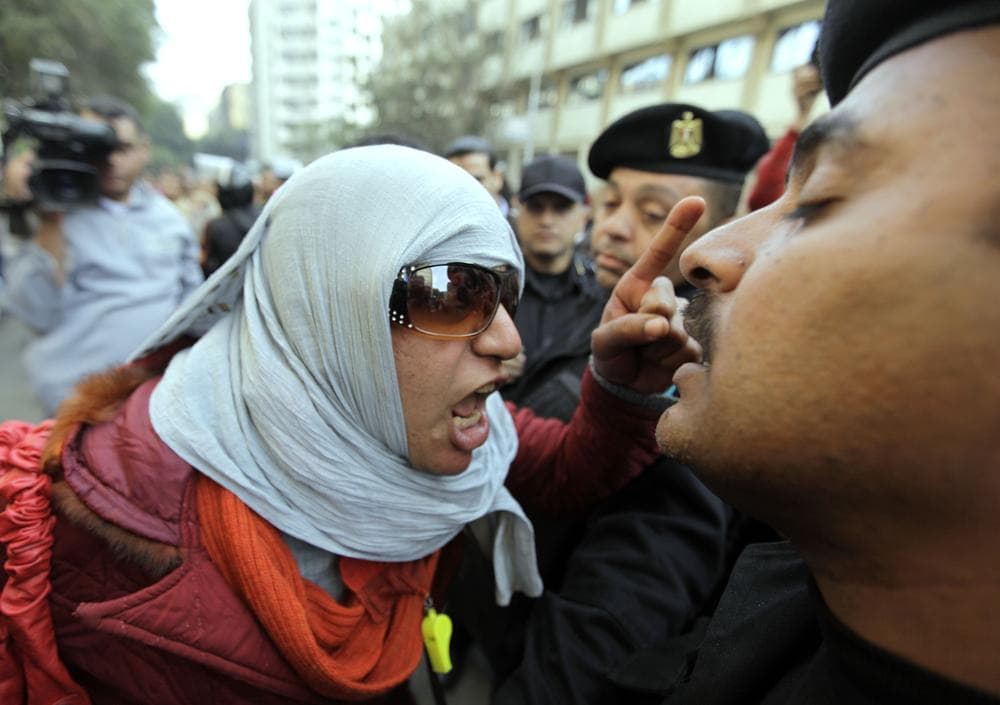
There's been discussion around our office about the role of women in the protests. Human rights activist Hossam Bahgat told us that there are thousands of women in the streets, but some photos show a sea of men with a rare head scarf-covered female.
Tell us how you think women are contributing to the protests in Egypt in the comment section below.
And check out the Facebook page, "Women Of Egypt," (login required) featuring photos of female protesters.
-Posted 10am, Monday, Jan 31
Audio report: Listen to this report from an Al Jazeera producer that 6 members of their news team have been detained in Cairo, equipment confiscated.
-Posted 10am, Monday, January 31
Revolt in Egypt: The View From The U.S.
The Obama Administration is watching the anti-government protests in Egypt closely to see what happens to Egyptian President Hosni Mubarek, a close alley to the U.S.
- Listen to our interview with John Bussey, former foreign services editor for the Wall Street Journal, he’s now the Washignton Bureau Chief for the paper. We also hear from Jillian York, who keeps an eye on the arab world from Harvard’s Berkman Center for Internet and Society.
-Posted noon, Friday, January 28





